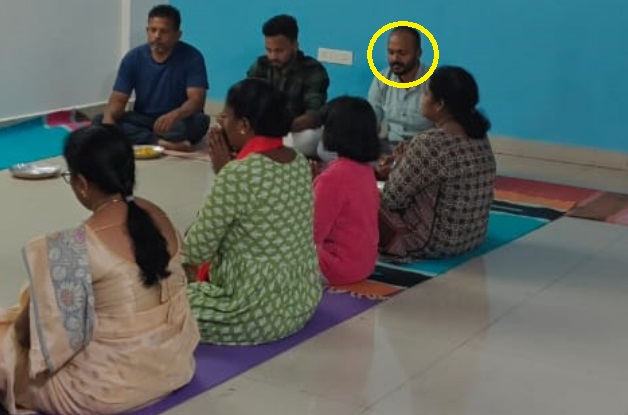It was January 3rd, a day like any other on our book distribution sankirtana, yet destined to be extraordinary by Śrīla Prabhupāda’s mercy. 🙏 Among the crowd, we approached Mr. Mohammed Ali, a thoughtful and calm gentleman. Presenting him a copy of the Bhagavad-gītā As It Is, we began sharing its timeless wisdom. Before we could delve too far, he smiled and said, “I already have this book.”
Surprised but encouraged, we asked where he had come across it. He explained that he had read it some time ago and found its teachings intriguing, though he hadn’t delved deeply into them. Seeing his interest, we invited him to our Bhakti-vṛkṣa program the next evening. He hesitated for a moment, then nodded, saying, “Alright, I’ll come and see what it’s about.”
✨ The Next Evening at Bhakti-Vṛkṣa ✨
As the kīrtana began, filling the room with the vibrations of the mahā-mantra, Mr. Ali walked in, a quiet yet curious observer. The melody seemed to resonate with him, and soon, he joined the clapping and swayed to the rhythm, as if reconnecting with a forgotten harmony.
✨ The Next Evening at Bhakti-Vṛkṣa ✨
As the kīrtana resonated through the room, Mr. Ali walked in, his curiosity evident. The mahā-mantra, Hare Kṛṣṇa Hare Kṛṣṇa, Kṛṣṇa Kṛṣṇa Hare Hare, Hare Rāma Hare Rāma, Rāma Rāma Hare Hare, seemed to captivate him. Soon, he was clapping softly, visibly moved by the joyful atmosphere.
After the chanting, the discussion began with a reading from the Bhagavad-gītā. We spoke about the universal truths it reveals, including the relationship between the jīvātmā (individual soul) and Paramātmā (Supersoul). At this point, Mr. Ali raised his hand.
🌀 Question 1: What is the relation between Ātmā and Paramātmā?
I explained, “The Bhagavad-gītā teaches that the Ātmā, the individual soul, is eternal and part of Kṛṣṇa, the Supreme Personality of Godhead. The Paramātmā, or Supersoul, resides in the heart of every living being as a witness and guide. Kṛṣṇa explains in the Gītā (15.7): ‘Mamaivāṁśo jīva-loke jīva-bhūtaḥ sanātanaḥ’—the living entity is an eternal fragment of Him. While the Ātmā is individual, the Paramātmā is the same in all beings, guiding us from within. By aligning with Paramātmā through bhakti (devotion), we can transcend material limitations and rediscover our eternal connection with God.”
Mr. Ali nodded thoughtfully. “This makes sense. So, it’s about reuniting with God by realizing this relationship?” he asked.
“Yes,” I replied, “and bhakti-yoga is the process to cultivate this realization.”
🌀 Question 2: What is Kṛṣṇa Consciousness, and how can one tap into this consciousness?
I continued, “Kṛṣṇa Consciousness means understanding that Kṛṣṇa is the ultimate source of everything—the cause of all causes—and living every moment in awareness of this truth. It’s about engaging our thoughts, words, and actions in loving service to Kṛṣṇa.
“You can tap into this consciousness through śravaṇam (hearing about Kṛṣṇa), kīrtanam (chanting His names), and smaraṇam (remembering Him). The practice of chanting the mahā-mantra is especially powerful, as it cleanses the heart and awakens our dormant love for Kṛṣṇa.”
Mr. Ali’s face lit up with excitement. “This is profound,” he said. “I can see how this connects with what I’ve been seeking—a deeper, personal relationship with God beyond rituals.”
After the session, during the discussion, we spoke about Bhagavad-gītā’s universal appeal and how it emphasizes the oneness of all living beings in their connection to the Supreme Lord, Kṛṣṇa. During this time, I felt inspired to discuss how spiritual leaders throughout history, including the Prophet Muhammad, convey the same divine truths according to time, place, and circumstance.
I explained, “The Prophet Muhammad can be understood as part of the Guru-tattva principle. He preached surrender to the Supreme, inspiring countless souls to align their lives with God’s will. This aligns perfectly with what Kṛṣṇa describes in the Gītā—how He empowers mahājanas to deliver His message in various forms.”
Mr. Ali’s face lit up as he listened. “This makes so much sense,” he said, “I’ve always felt that God sends His messengers to guide us. But I see now that their teachings point to a greater unity. It’s incredible to think of Allah as a form of Kṛṣṇa—impersonal yet all-encompassing. It aligns with what I’ve always believed, but it adds depth I’ve never thought about before.”
We then spoke about how Bhakti-yoga offers a personal relationship with God while recognizing His impersonal aspect. I shared how the Vedic texts balance these dimensions of God, explaining that one can simultaneously worship the formless (Brahman) and the personal (Bhagavān).
Mr. Ali smiled warmly and said, “This is the clarity I’ve been looking for. It feels like a missing piece of the puzzle. There is so much more to learn.”
Srila Prabhupada who can understand your magic. Feeling very humbled to be an instrument please bless Ali and our BV members we could take this to next level for your pleasure.🙏🙇♂️
